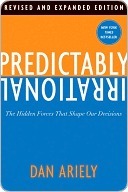More on this book
Community
Kindle Notes & Highlights
by
Dan Ariely
Read between
June 17 - June 25, 2020
humans rarely choose things in absolute terms. We don't have an internal value meter that tells us how much things are worth. Rather, we focus on the relative advantage of one thing over another, and estimate value accordingly.
most people don't know what they want unless they see it in context.
But Sam also knows that given three choices, most people will take the middle choice (as in landing your plane between the runway lights).
we not only tend to compare things with one another but also tend to focus on comparing things that are easily comparable—and avoid comparing things that cannot be compared easily.
That's a lesson we can all learn: the more we have, the more we want. And the only cure is to break the cycle of relativity.
other words, the sensitivity we show to price changes might in fact be largely a result of our memory for the prices we have paid in the past and our desire for coherence with our past decisions—not at all a reflection of
when a social norm collides with a market norm, the social norm goes away for a long time. In other words, social relationships are not easy to reestablish.
you're a company, my advice is to remember that you can't have it both ways. You can't treat your customers like family one moment and then treat them impersonally—or, even worse, as a nuisance or a competitor—a moment later when this becomes more convenient or profitable.
In a social exchange, after all, people believe that if something goes awry the other party will be there for them, to protect and help them. These beliefs are not spelled out in a contract, but they are general obligations to provide care and help in times of need.
MONEY, AS IT turns out, is very often the most expensive way to motivate people. Social norms are not only cheaper, but often more effective as well.


